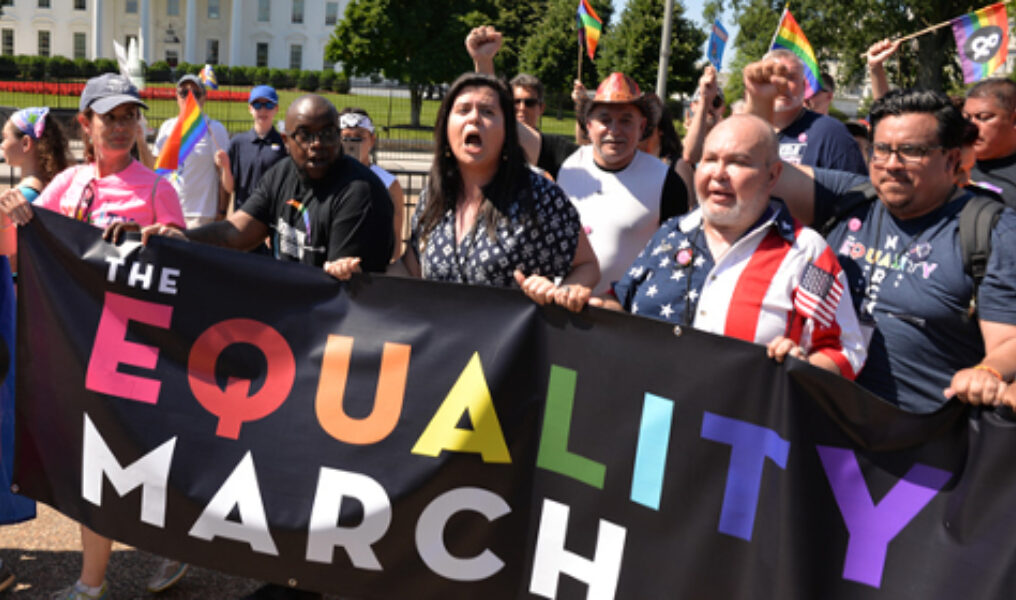This weekend's Capital Pride festivities in D.C. will take place on the one-year anniversary of the June 11, 2017 Equality March for Unity and Pride, an LGBT protest march that drew as many as 80,000 LGBT people and their allies to the nation's capital from across the country.
Dozens of affiliated LGBT marches that same day took place in cities and towns throughout the country as well as in a number of countries in Europe and Asia.
Several organizers and supporters of the Equality March told the Washington Blade this week that the Washington march and the numerous affiliated marches motivated many LGBT people to become politically active over the past year that would have a beneficial impact for LGBT rights in the November 2018 midterm elections on the state and national level.
"We here in D.C. were already activated in our community," said Ashley Smith, a D.C. LGBT rights advocate and one of 13 co-chairs of the Equality March. "But from the Washington march and the marches that took place across the country and across the world, we have seen and are hearing about people who have been continually engaged in their communities," Smith said.
"So have more people become engaged in the election process? Yes," said Smith. "Have more people become aware of the importance of knowing what is taking place on the state and local levels are just as important as what is taking place on the national level? Yes," he said.
He said he believes the Equality March played a role in bringing about that increase in activism and involvement among LGBT people.
Brian Pendleton, who initiated Los Angeles' version of the Equality March, which organizers called the Resist March, said that march and many others across the country also had the effect of bringing together a diverse cross section of the LGBT community that sometimes had not worked in unity.
"The Resist March was a great vehicle to get people to come together and march on the streets and be together and support each other," Pendleton said. "I think people still remember fondly marching down the streets of Los Angeles, over 100,000 of us, making sure that not only the president of the United States but the world knew where we stand," he said.
Pendleton was referring to concerns among LGBT rights activists over the policies of the Trump administration that have in a number of areas rolled back policies and programs supportive of LGBT rights put in place by the Obama administration.
In a development that surprised some LGBT rights advocates, the Equality March got its start when a gay man in New York City, acting on his own, created a Facebook page calling for an LGBT march on Washington modeled after the Women's March on Washington, which took place on Jan. 21, 2017, the day after President Trump's inauguration.
New Yorker David Bruinooge, the Equality March's founder, said he became inspired by the women's march, which drew hundreds of thousands of women and their supporters to Washington to protest the expected polices of Trump and his administration on a wide range of issues, including women's rights.
The response to Bruinooge's Facebook page quickly mushroomed, with thousands of people expressing support for an LGBT march along the lines of the women's march. Shortly after Bruinooge set June 11, 2017 as the date for the march, which was the day already set for D.C.'s Capital Pride Festival, other LGBT activists stepped in to help Bruinooge organize the march.
Bruinooge couldn't immediately be reached for comment this week.
In April 2017, Equality March organizers announced that 13 co-chairs for the march had been chosen who represented diverse segments of the LGBT community, including African Americans, Latinos, Native Americans, and transgender people, among others.
One of the co-chairs, Jose Plaza, who at the time served as president of the D.C. Latino GLBT History Project, said this week that he, too, believes the Equality March would have a lasting impact on the effort to advance LGBT equality.
"It built a great momentum to carry over long after the march," he told the Blade. "It was a catalyst for mobilizing people to the polls in elections and for other things," he said. "This is a longtime fight for LGBT rights and the fight is moving from a march to the polls."
Stephen Peters, national press secretary and spokesperson for the Human Rights Campaign, agreed with Plaza that the Equality March and its affiliated marches throughout the country would have a positive impact for LGBT rights in the upcoming elections.
"Over the past year, HRC has been working to harness the momentum from these marches to focus on action and turning out the vote," Peters said. He said HRC recently launched a program aimed at mobilizing "10 million LGBTQ voters and allies across America to turn out and vote this November and help ensure we hold this administration accountable by electing a pro-equality majority to Congress."
Stacy Long Simmons, director of the National LGBTQ Task Force's Advocacy and Action Department, said the Task Force was proud to have taken part in the Equality March.
"Looking back on the march a year later, the Equality March was a point in time that marked a clear turning point for activism within the LGBTQ community," Simmons said. "The march was inspired by the country's mood after the 2016 elections and acts of resistance were happening everywhere," she said.
"For the first time, whether it was people of faith, immigrants, queers of color, transgender people, women, or those living with disabilities, the Equality March was an amalgam of diverse voices that more accurately reflected today's LGBTQ movement with unity and pride," she said.
This article originally appeared in the Washington Blade and is made available in partnership with the National Gay Media Association.










